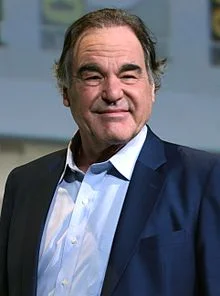
Oliver Stone
Oliver Stone is an American film director, producer, and screenwriter. Stone won an Academy Award for Best Adapted Screenplay as writer of Midnight Express (1978), and wrote the gangster film remake Scarface (1983). Stone achieved prominence as writer and director of the war drama Platoon (1986), which won Academy Awards for Best Director and Best Picture. Platoon was the first in a trilogy of films based on the Vietnam War, in which Stone served as an infantry soldier. He continued the series with Born on the Fourth of July (1989)—for which Stone won his second Best Director Oscar—and Heaven & Earth (1993). Stone's other works include the Salvadoran Civil War-based drama Salvador (1986); the financial drama Wall Street (1987) and its sequel Wall Street: Money Never Sleeps (2010); the Jim Morrison biographical film The Doors (1991); the satirical black comedy crime film Natural Born Killers (1994); a trilogy of films based on the American Presidency: JFK (1991), Nixon (1995), and W. (2008); and Snowden (2016).
Books Mentioned in The Joe Rogan Experience (JRE) #1992 - Oliver Stone
Book Title: A Bright Future: How Some Countries Have Solved Climate Change and the Rest Can Follow
Author: Joshua S. Goldstein, Staffan A. Qvist
Joe Rogan & Oliver Stone - A Deep Dive into Nuclear Power
In a thought-provoking episode of The Joe Rogan Experience, Joe Rogan sat down with acclaimed filmmaker Oliver Stone to delve deep into the world of nuclear power. A topic surrounded by fear, misconceptions, and controversies, nuclear power has been at the forefront of debates for decades. Through their conversation, Rogan and Stone shed light on the complexities of the subject, addressing both the perceived and real dangers of this powerful energy source.
Perceptions vs. Realities
For many, the mere mention of nuclear power conjures images of catastrophic meltdowns and apocalyptic landscapes. However, as Stone articulately points out in the discussion, there’s a significant difference between what feels dangerous and what is genuinely risky. The duo delved into analogies comparing the inherent risks of nuclear power to everyday activities. Driving a car, for instance, is fraught with potential danger but doesn’t invoke the same fear as flying in an airplane—even though statistically, flying is safer. In a similar vein, the actual dangers of nuclear power, when juxtaposed with other energy sources, especially coal, present a compelling argument for its relative safety.
Historical Incidents and Their Impact
No discussion on nuclear power is complete without addressing the significant incidents that have shaped public perception. Three Mile Island, Chernobyl, and Fukushima—each name evokes vivid memories and emotions. While these events were undoubtedly tragic and highlighted the potential dangers of nuclear power, the broader public response, often driven by fear, overshadowed the nuanced understanding of these incidents. Stone and Rogan delved into the anti-nuclear movement that gained momentum post-Three Mile Island, driven in part by celebrities and high-profile concerts. This movement, while well-intentioned, often lacked a comprehensive understanding of the actual risks and benefits of nuclear energy.
Conclusion
The conversation between Joe Rogan and Oliver Stone on nuclear power offers a refreshing perspective on a contentious topic. By juxtaposing perceptions with realities and delving deep into historical incidents, they underscore the importance of an informed discussion on nuclear power. As the world grapples with energy needs and environmental concerns, such conversations are not just relevant but crucial.
Joe Rogan and Oliver Stone Discuss Climate Change and Air Pollution
Joe Rogan and Oliver Stone delve into the climate change discussion, emphasizing the critical nature of the issue. Rogan notes his support for nuclear energy as a cleaner alternative, irrespective of the climate change debate. Stone references the IPCC (Intergovernmental Panel on Climate Change), highlighting their predictions and the accuracy of their past forecasts. He expresses concern about the illogical path humanity is following, especially considering the alarming data on CO2 levels and their impact.
Rogan also addresses the ideological aspects of climate change. He points out how narratives on both sides of the political spectrum often overshadow scientific facts. Rogan criticizes those who dismiss climate change as a natural cycle without substantial research, highlighting the importance of a well-informed debate rather than ideologically driven arguments.
Air Pollution: The Overlooked Impact of Brake Dust
A significant portion of the conversation focuses on a lesser-known environmental issue: brake dust pollution. Rogan explains that brake dust, produced by the friction of brake pads against discs in vehicles, contributes significantly to air pollution. This particulate matter, often overshadowed by exhaust fumes, is a concern in urban environments.
The discussion touches on the differences in pollution between traditional and carbon fiber brakes. Rogan points out that carbon fiber brakes produce significantly less dust, making them a more environmentally friendly option. He emphasizes the importance of considering such factors in environmental discussions, moving beyond the usual focus on exhaust emissions.
Broader Reflections on Fear and Society
Stone and Rogan reflect on the broader societal implications of these environmental concerns. They discuss how media sensationalism and dystopian narratives can lead to a culture of fear. Rogan argues for a balanced approach, acknowledging the importance of being informed but also living in the present to avoid constant anxiety.
The conversation also touches on the potential for technological advancements to mitigate environmental issues, such as converting radioactive waste into batteries.
Conclusion
Throughout their discussion, Rogan and Stone highlight the complexity of environmental issues like climate change and air pollution. They stress the importance of moving beyond ideological narratives to understand the scientific realities and potential solutions. The conversation serves as a reminder of the need for informed and nuanced discussions in addressing the environmental challenges facing our planet.

